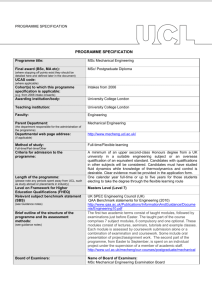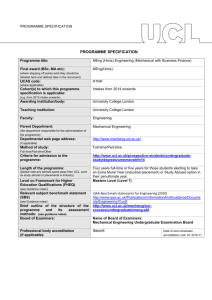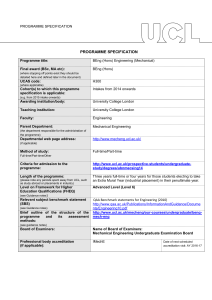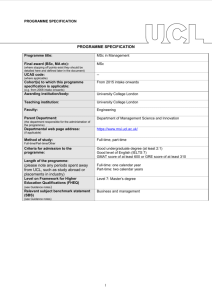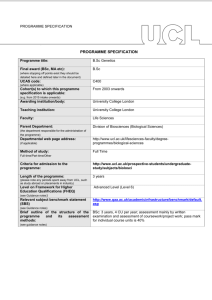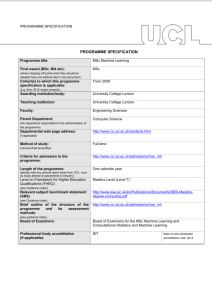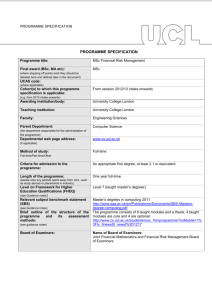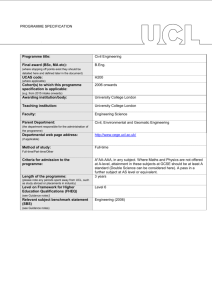MSc Power Systems Engineering
advertisement
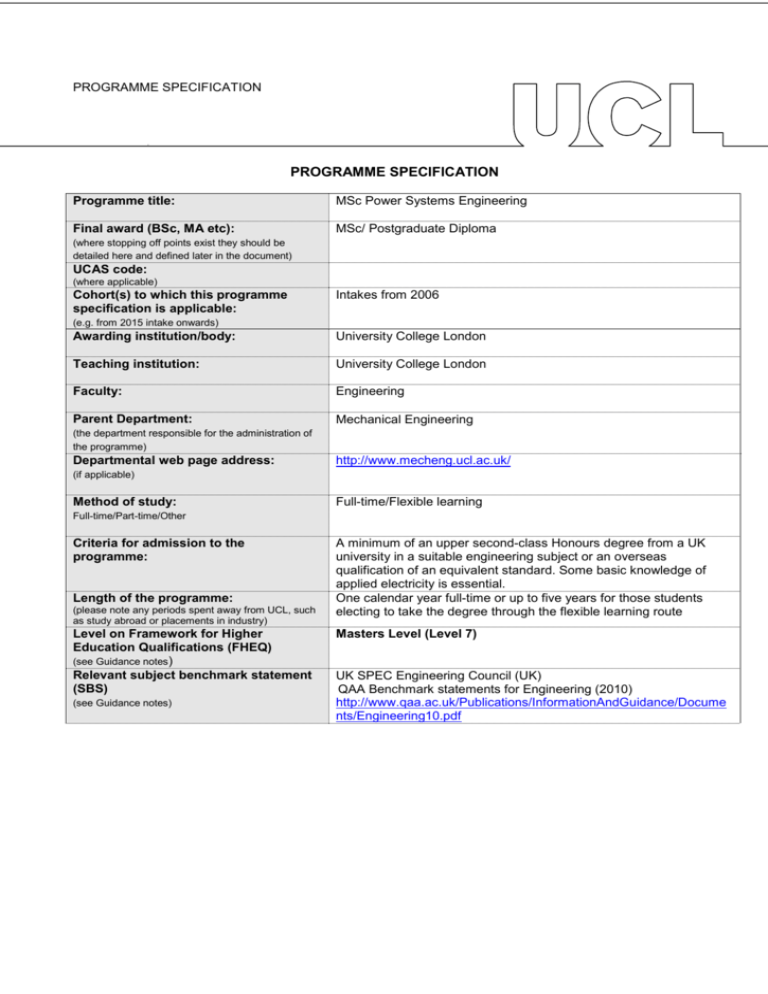
PROGRAMME SPECIFICATION PROGRAMME SPECIFICATION Programme title: MSc Power Systems Engineering Final award (BSc, MA etc): MSc/ Postgraduate Diploma (where stopping off points exist they should be detailed here and defined later in the document) UCAS code: (where applicable) Cohort(s) to which this programme specification is applicable: Intakes from 2006 (e.g. from 2015 intake onwards) Awarding institution/body: University College London Teaching institution: University College London Faculty: Engineering Parent Department: Mechanical Engineering (the department responsible for the administration of the programme) Departmental web page address: http://www.mecheng.ucl.ac.uk/ (if applicable) Method of study: Full-time/Flexible learning Full-time/Part-time/Other Criteria for admission to the programme: Length of the programme: (please note any periods spent away from UCL, such as study abroad or placements in industry) Level on Framework for Higher Education Qualifications (FHEQ) (see Guidance notes) Relevant subject benchmark statement (SBS) (see Guidance notes) A minimum of an upper second-class Honours degree from a UK university in a suitable engineering subject or an overseas qualification of an equivalent standard. Some basic knowledge of applied electricity is essential. One calendar year full-time or up to five years for those students electing to take the degree through the flexible learning route Masters Level (Level 7) UK SPEC Engineering Council (UK) QAA Benchmark statements for Engineering (2010) http://www.qaa.ac.uk/Publications/InformationAndGuidance/Docume nts/Engineering10.pdf Brief outline of the structure of the programme and its assessment methods: (see guidance notes) The first two academic terms consist of taught modules, followed by examinations just before Easter. The taught part of the course comprises 7 subject modules, 6 compulsory and one optional. These modules consist of lectures, seminars, tutorials and example classes. Each module is assessed by coursework submission alone or a combination of examination and coursework. Some include oral presentation of project/assignment work. The second part of the programme, from Easter to September, is spent on an individual project http://www.ucl.ac.uk/mecheng/our-courses/postgraduate/powersystems Board of Examiners: Name of Board of Examiners: MSc Power Systems Engineering Examination Board Professional body accreditation (if applicable): IMechE; IMarEST; IET Date of next scheduled accreditation visit: AY2016-17 EDUCATIONAL AIMS OF THE PROGRAMME: This degree programme is designed to give graduates with first degrees in Mechanical or Electrical Engineering the necessary knowledge and skills to work at a professional level in industries involved in the production, distribution and consumption of electric power. The range of industries includes mass transport, advanced propulsion trains, and alternative methods of power generation. The degree comprises study in analysis and design of power engineering systems and the use of computers in power systems engineering analysis. The degree is suitable for students wishing to become Chartered Professional Engineers and to pursue careers in higher levels of management, in manufacturing and in power engineering including renewables. PROGRAMME OUTCOMES: The programme provides opportunities for students to develop and demonstrate knowledge and understanding, qualities, skills and other attributes in the following areas: A: Knowledge and understanding Knowledge and understanding of: the underpinning mathematics and engineering science associated with a career in electrical power engineering. engineering principles, quantitative methods, mathematical and computer modelling to enable them to exercise their engineering disciplines effectively. specific subject areas and associated research directed towards advanced and emerging technologies, as well as developing an understanding of concepts from a range of areas peripheral to power systems engineering, such as renewable energy sources, power transmission and conventional thermal power plant. design as applied to conceptual and system engineering problems. codes of practice, standards and quality issues as applicable to a career as a professional engineer, with an awareness of intellectual property issues and of environmental ethical issues within the modern industrial world. project management skills appropriate for a career in engineering and an understanding of the application of these skills in a commercial and/or research environment. the requirement to communicate effectively in both formal report writing and in oral presentations. Teaching/learning methods and strategies: The knowledge and understanding outlined above is acquired through a combination of lectures, tutorials, individual and group projects, practical laboratory work and coursework assignments, in some case involving computational analysis. Assessment: Assessment is through a combination of written and oral examinations and assessed coursework. In all courses in which there is an examination scheduled at the end of the second term, the examination normally constitutes 65% of the overall mark. In some courses, such as Advanced Computer Applications in Engineering, the assessment is entirely based on the assessment of the coursework as there is no written examination paper. Coursework assessment varies from course to course and includes the evaluation of laboratory reports, technical reports, problem solving exercises, project reports, assessment of computational and modelling skills, oral presentations and viva-voce examinations. B: Skills and other attributes Intellectual (thinking) skills: to identify and define a power engineering problem that may be unfamiliar and generate practical as well as innovative solutions the ability to apply appropriate methods to model such solutions and assess the limitations of the method. the ability to successfully undertake a design or research project, taking account of constraints such as time, cost, health and safety as well as environmental issues. associated with rational and objective decision making arising from conducting a substantial engineering based research project. the ability to make general evaluations of commercial risk. the ability to identify and implement appropriate information and communication technology solutions. the means to develop and exercise written and oral communication skills in preparation for a professional engineering career. Teaching/learning methods and strategies: The knowledge and understanding outlined here is acquired through a combination of lectures, tutorials, individual project and group projects, design and/or research projects, practical laboratory work and coursework assignments. Assessment: As indicated in section A above. C: Skills and other attributes Practical skills (able to): successfully undertake a major design or research project, taking account of constraints such as time, cost, health and safety as well as environmental issues. make general evaluations of commercial risk. identify and implement appropriate ICT solutions. develop and exercise written and oral communication skills in preparation for a professional engineering career. Teaching/learning methods and strategies: These practical skills are acquired through individual projects and group projects, practical laboratory work and coursework assignments. Assessment: These skills are evaluated from the assessment of laboratory reports, technical reports, problem solving exercises, assessment of computational skills, tests and oral presentations and, where necessary, vivavoce examinations. D: Skills and other attributes Transferable skills (able to): develop and exercise written and oral communication skills in preparation for a professional engineering career. work effectively as a member of a small team. arrange appropriate work schedules to meet specified deadlines. Teaching/learning methods and strategies: These skills are acquired through, individual projects and group projects, practical laboratory work and coursework assignments. Assessment: As indicated in section C above. The following reference points were used in designing the programme: the Framework for Higher Education Qualifications: (http://www.qaa.ac.uk/en/Publications/Documents/Framework-Higher-Education-Qualifications-08.pdf); the relevant Subject Benchmark Statements: (http://www.qaa.ac.uk/assuring-standards-and-quality/the-quality-code/subject-benchmark-statements); UK Engineering Council UK-SPEC: http://www.engc.org.uk/ecukdocuments/internet/document%20library/UKSPEC.pdf the programme specifications for UCL degree programmes in relevant subjects (where applicable); UCL teaching and learning policies; staff research. Please note: This specification provides a concise summary of the main features of the programme and the learning outcomes that a typical student might reasonably be expected to achieve and demonstrate if he/she takes full advantage of the learning opportunities that are provided. More detailed information on the learning outcomes, content and teaching, learning and assessment methods of each course unit/module can be found in the departmental course handbook. The accuracy of the information contained in this document is reviewed annually by UCL and may be checked by the Quality Assurance Agency. Programme Organiser(s) Prof R W G Bucknall Name(s): Date of Production: October 2008 Date of Review: 16 September 2014 Date approved by Head of Department: 16 September 2014 Date approved by Chair of Departmental Teaching Committee: Date approved by Faculty Teaching Committee 16 September 2014 24 November 2014
